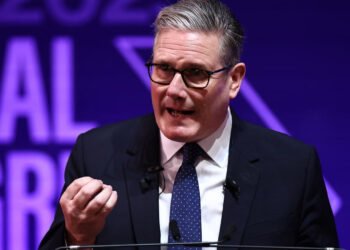According to new projections from the International Monetary Fund (IMF), the UK is set to be the second-fastest-growing of the world’s most advanced economies this year.
The G7 are seven advanced economies – the US, UK, France, Germany, Italy, Canada and Japan.
The IMF noted that UK economic growth rates remain modest at 1.3% for this year and next, but that outperforms the other G7 economies apart from the US in 2025, in a year of trade and geopolitical tensions.
In the IMF’s forecast for economic growth, it predicts that the UK will push Canada out of second place, after its trade-war-affected economy was hit by the biggest downgrades for 2025 and 2026.
However, Canada is expected to retake second place next year when its economy is forecast to grow at a rate of 1.5%.
Germany, France and Italy are all forecast to grow far more slowly at rates of between 0.2 and 0.9% in 2025 and 2026.
However, the IMF also predicts the UK will face the highest rate of inflation in the G7 both this year and next, driven by rising energy and utility bills.
Prices are forecast to rise by 3.4% this year and 2.5% in 2026, but the IMF says higher inflation is likely to be temporary, and should fall to 2% by the end of next year.
The IMF said that a slight overall upgrade for the UK in its World Economic Outlook, from its previous outlook in April, was due to “strong activity in the first half of 2025” and an improved trade outlook, partly thanks to the recently announced US-UK trade deal.
The global outlook is dominated by the so far “muted response” of the world economy to the imposition of hefty tariffs on almost all imports into the US, a weakened dollar, questions about the independence of the US Federal Reserve and sky-high valuations of US tech companies.
The IMF expects some of this to unwind soon, saying “resilience is giving way to warning signs.” In the US, tariff costs which had been absorbed by exporters and retailers, are now feeding into higher goods prices.
So far tariffs have been reflected in higher prices for American shoppers of household appliances, but not of food and clothing.
The IMF cited Brexit as an example of how uncertainty around major changes in trading arrangements can, after a delay, lead to steady falls in investment.
Reeves Welcome Upgrade To IMF’s Outlook For UK’s Economy
Responding to the improved forecast for UK growth this year, the Chancellor, Rachel Reeves, said, “This is the second consecutive upgrade to this year’s growth forecast from the IMF.”
“It’s no surprise, Britain led the G7 in growth in the first half of this year, and average disposable income is up £800 since the election.”
Rachel Reeves
However, highlighting the inflation forecasts, Shadow Chancellor Sir Mel Stride said that the IMF assessment made for “grim reading.” He said that UK households were “being squeezed from all sides.”
“Since taking office, Labour have allowed the cost of living to rise, debt to balloon and business confidence to collapse to record lows.”
Sir Mel Stride
Presenting the report, the IMF Chief economist, Pierre-Olivier Gourinchas, stressed that inflation in the UK had been boosted by temporary factors, but raised concern about the outlook. “We expect that this will moderate going forward, but there are risks – we see some upside risks,” he said.
He pointed to strong wage growth, as well as higher expectations of future inflation. “Households and firms in the UK are becoming maybe a bit less certain that inflation is coming down quickly,” he stated.
Commenting on rising yields on UK government bonds, which have pushed up the cost of borrowing for the Treasury, Gourinchas suggested global factors were largely to blame.
Gourinchas said these upside inflation risks meant the Bank of England should be “very cautious in its easing trajectory,” meaning policymakers should not rush to cut interest rates.





















